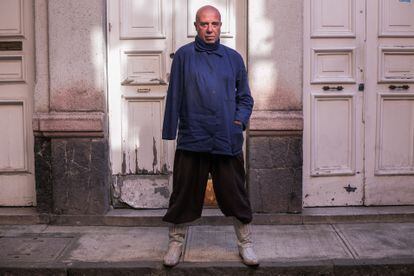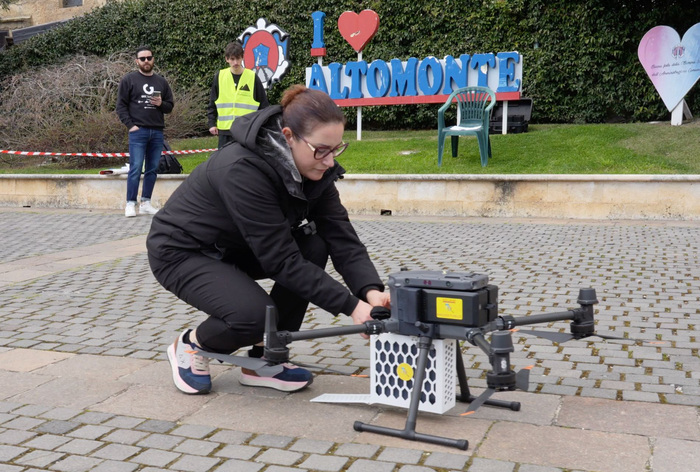Chatting with Mario Bellatin about his life and his books is akin to riding a Ferris wheel.
The conversation can move forward by following plans to create a total novel, an endless prequel to all of his previous works;
and then go back to medical tests, childhood memories or his controversial departure two years ago as director of FONCA, the historic Mexican scholarship program.
And while, everything keeps going round and round about the idea of an autonomous writing at war against the classical notions of time and memory.
Always on the go, Bellatin has published eight books this year and has discovered a strange family secret that has shaken his life and, of course, his work too. The son of Italian migrants to Peru, his mother was prescribed a dangerous drug invented during World War II during pregnancy. Now, 60 years later, he has been able to confirm that this is the cause behind his being born without his right forearm and other unsuspected health disorders.
Disease, physical deformations, sacrificial violence or death are themes that already ran through all of his work, translated into more than 20 languages. A highly personal, experimental and cult author –together with Borges or Bolaño he has been one of the 10 writers in Spanish represented by the literary superagent Andrew Wyle–, the Bellatin universe overflows the literary world to get closer to the codes of contemporary art. 10 years ago he presented an opera filmed in Ciudad Juárez, the deadliest place in Mexico, at the Documenta in Kassel, based on a story of his about a Japanese entomologist who eats himself.
In the living room of his home-studio in Mexico City, a bright building from the beginning of the last century with a spartan elegance, his dogs Fabulous and Benito will not stop running around during the more than three hours of interview.
Almost at the same speed that its owner is reeling off the details of the latest event in his biography.
A new notch to continue feeding back the mythology of his work.
Ask.
Tell me well about that pill?
Answer
.
In these times of pandemic I have been reviewing many things: since I was born, why I was born like this, why I had seizures, a series of things that make me different and that I have never brought to light, beyond the obvious, that I one arm is missing.
But it is not only that.
Q.
And what have you discovered?
R.
The death of my mother last year was like revealing my origins, the reason for many types of disorders.
It is that I come from a Nazi experiment.
I am one of the few survivors of what happened 60 years ago, because many died.
Q.
Does it have to do with your family being Italian?
R.
Well I have a horrible Italian family.
I think this was revenge for having been fascists.
Because the Nazi laboratories created a substance… Well, first they created sarin gas.
Do you know what sarin gas is?
P.
No.
R.
It is a biological weapon that what it does is attack the nervous system.
People kind of lost consciousness, they were beside themselves.
So they, the Nazi laboratories, were looking for an antidote to sarin gas so that when they put it out they would take the antidote and they might not have the effects of the gas.
So, in search of the antidote, they found thalidomide, which was like ecstasy.
This seems a lie, but it is true.
Q.
Well, Hitler was very fond of amphetamines.
A.
Or amphetamines, I don't know, but they created something that made you happy for a while.
Well, we don't know much about what happened to German civil society after the end of the Second World War.
We have the account of the victors, but it was never known what happened to civil society after those dreadful bombings that decimated Berlin or Dusseldorf.
Mario Bellatin in his apartment in the Juárez neighborhood in Mexico City.
Quetzalli Nicte Ha
Q.
And what happened?
R.
There is a small book by Sebald that tells that after the bombings the violence was such that artificial storms were created. So they started giving people that drug, thalidomide. They gave everyone that. And they walked as happy, everyone was ecstatic. That period where the population was completely out of their minds lasted eight, nine years and the German miracle came again. Suddenly they began to make Volkswagen and rebuild the cities. It was very fast. Hitler seems to be about 1,700, but no, it's right now. I was born in 1960 and that ended in 45, twenty years before I was born. There has never been that rupture that they made us believe, that we started from scratch after all these horrors, concentration camps and all that. No.
Q.
But let's get back to the pill.
A.
Yes, the pill was distributed in Germany so that people would not notice those horrors.
But since society was reinvented very quickly, it was no longer necessary.
So, they did not know what to do with the pill, but there was much happiness left.
So a German laboratory and the alcohol industry agreed.
Johnnie Walker, Jim Gordon, Smirnoff, all the classic brands.
They already knew that very soon alcohol was going to be replaced by drugs.
So the alcohol industry opened a pharmaceutical company just for that drug.
It was like the 50s. The pill was going to come with your whiskey.
Q.
But did they sell it together?
A.
No, but that was like the future.
We are going to make official synthetic drugs.
So, they began to apply them at first to pregnant women because at that time the disorders of the first months of pregnancy were attributed to hysteria in women.
They had nausea, dizziness, vomiting.
It was obviously a hormonal issue.
It's like testosterone, and those gay conversion practices where they put testosterone.
But testosterone doesn't change your sexual orientation, what it does is exacerbate your sexual desire.
So if someone has a gay interest and you put testosterone into them, they are going to want to fuck more gays.
I explain?
Q.
Yes, but let's get back to the pill.
A.
They forced the doctors to prescribe them to pregnant women who felt bad.
My mom took it.
Now that he is dead I can speak more openly.
Suddenly, in the year I was born, in 1960, a number of shitty children begin to be born.
Since my mom took a diluted dose, the damage was less.
The worst cases are in Germany and England, because there they gave him the pure dose.
There have been international trials.
I went to see if they could give me compensation ...
Q.
To Germany or England?
A.
To Germany because there were only two scientists who could give you a certificate that you were a victim of thalidomide.
Already with the sentences there are many testimonies.
In hospitals when children were born, almost all of them were killed in maternity wards so as not to tell their parents that their baby had neither feet, nor arms, nor anything.
Well, Fassbinder has a documentary on thalidomide.
The mother comes out screaming, saying that she is ashamed and that she wants to kill the son.
Others died young because they had little chance of life, they were in their 20s, almost like those affected by Down syndrome
Q.
Were you compensated?
R.
No, because my mother did not take it in Germany but in Mexico.
But the doctor told me: "You are a mutant."
So, they gave me a mutant certificate.
How cool they told me I'm a mutant, huh?
Q.
So it says on the certificate?
A.
Yes, a “Mutant” certificate.
Q.
What more sequels have you had from that?
R.
Everything began to make sense.
For like 20 years I had strange things, seizures, strange asthmas, things like psychosomatic.
That is why I resigned from the leadership of FONCA.
The writer Mario Bellatin in his apartment in the Juárez neighborhood in Mexico City.Quetzalli Nicte Ha
P.
The official statement from the Ministry of Culture only said that due to medical problems.
A.
Yes, I resign about a week before all the controversy.
I was unlucky that the first one I discovered stealing in such a blatant way was Young Creators.
And people like what they want to do is shout, they accused me of going against young people.
There is a letter where all the famous ones sign to defend this guy.
The hatred was absolute and that is how the mob began.
Luckily I don't have Twitter but my doctor called me and made me quit.
He gave me a medical receipt.
P.
Because of the risk that stress will worsen your diagnosis?
A.
Yes, because around 30-something I got these seizures, like epileptic seizures.
I took 48,000 exams.
Nothing came out until my current doctor, the director of the Institute of Nutrition, a specialist in rare diseases, managed to stop me from having these attacks using a pill ...
Q.
Another pill.
A.
Yes, because the antiepileptic drugs were terrible for me.
I almost die.
He gave me Valium.
An ancient medicine that began to be used in the sixties for ladies who wanted to sleep.
Every day I take Valium to stabilize myself.
Before that, once I almost died because Stevens-Johnson gave me which is another evil that he does not give to anyone either, which is that the body becomes all a welt, which is supposedly what he gave to Job, the one with the Bible.
Q.
Did you feel the pressure during the controversy over FONCA?
R.
I am not a politician and I thought that was going to arm me.
I mean, what does it matter to me if they tell me anything?
But then they started messing with my body.
Nursery school stuff: "What is left of his ego, he lacks an arm."
So I said if they start with this the other step is going to be my books.
I said: "Damn, they're going to leave me with nothing."
And my doctor told me: "No, I forbid you to continue, because it has cost us a lot to get you out of seizures and this wave that is happening in social networks you will not endure, so I forbid you to continue."
Q.
How has your relationship with your mother been all these years?
R. What
I did with my parents was a divorce more or less.
She said that I hated them, my parents, which by the way, is something she applied to my Carlos Monsiváis.
I mean, what the hell, isn't it easier for them to recognize that they don't like me?
And mom did that.
Her excuse was that I hated her because she was born that way, and that I had never been able to forgive her.
Faced with a maternal sentence or father's word, whatever they want to call it Kafkaesque, well, what do you do?
Q.
Have you ever been psychoanalyzed?
A.
Yes, a lot.
I'm pissed.
Q.
Have they stopped already?
R.
In Mexico that does not turn on.
Q.
Why?
R.
Because Mexico is not by ear.
Mexico is by sight.
Argentina is by ear.
Q.
All this family history seems to be taken from one of your books. This thing about a writer without memory, who fills in those gaps with a kind of automatic writing. All that universe of paradoxes and unfolding of identity. How has this discovery affected your work?
R.
I have a text, which may be the beginning of the next book, which begins like this: "99.9% of human activities are denied to me."
I have noticed two things that are in the text.
Two elements precede my birth and that keeps me writing.
Writing is an impulse that precedes consciousness.
I remember as a child sitting at the breakfast table and looking at the newspaper.
Suddenly turn to the glass of milk and see how the newspaper began to move.
I said: "What's wrong with me?"
Suddenly it came to life, it moved, and I began to see it form sentences.
That for me was like a first birth.
Q.
What was the other epiphany?
R.
The other was with the machine I'm writing with right now and that is the one I used as a child, which I have stolen from my grandparents' house.
At the age of 8 I made my first print.
I started typing and made a line.
Suddenly, seeing myself in the printed letter was as if it just existed, because that which is there, that letter is what exists and not me, who am an excrescence.
Q.
Almost four years ago you told me that you were preparing your definitive work, based on all the previous ones.
A.
What I am doing now is like a portable file.
I am not writing forward, towards the new.
A file that somehow converse with this present but where all of them were also valid.
I explain?
Not to invalidate the past, but so that there is the same writing that runs parallel in time.
I am more and more interested in the path that is not the literary path, because the literary path seems increasingly boring to me.
P.
More similar to the approaches of contemporary art.
R.
Well, for example, right now I wonder a lot about photography.
I'm interested in much more than seeing what happens in the cinema, for example.
Q.
You studied cinema in Cuba.
A.
Yes, that's where I decided to become a writer and where I learned the importance of publishing. For example, in what I am writing now, the owner of
the Beauty Salon
[his most celebrated work]
reappears,
but he is not the one that everyone imagines. Everyone thought he was a hairstylist from a Latin American slum. No, now it is suggested that the owner of the beauty salon was someone from Europe, fled from concentration camps. Because a lot of all that rigor that the beauty salon establishes, all that regulation about being places made for death, has a lot to do with Auschwitz, it has a lot to do with the camps. And that character also merges with another from another previous book,
Blind Poet
, where there was a pedagogue, Boris.
So, there are no longer only beauty salons for death, but small schools for death, so that children die clean and at least with a minimal culture, as a kind of double perversion.









